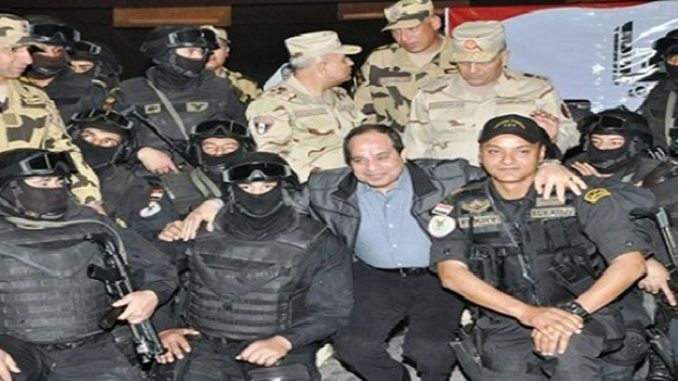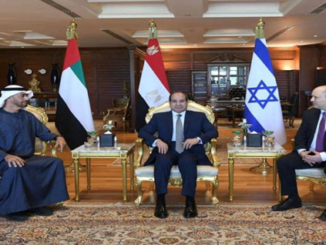
In August 2015 Egypt enacted a sweeping anti-terror law that broadly defined terrorism as an act that disturbs public order with force. It was seen as part of Abdel Fattah Al-Sisi’s sweeping crackdown on dissent, which has worsened as he has consolidated his power.
These latest amendments toughen penalties for terror-related crimes, expand the definition of financing terrorism and impose the death penalty on people found guilty of funding terror groups and acts.
The UN is alarmed at increasing practices of arbitrary detentions, torture, ill-treatment, the absence of judicial oversight, restrictions on freedom of expression and the right to peaceful assembly in the country, the report says.
In Egypt’s Sinai Peninsula, Al-Sisi has been waging a war on terror since he assumed power, which local citizens describe as a war on civilians, that is completely disproportionate to the threat that is posed.
Anti-terror laws have given the government cover to increase human rights abuses in the peninsula, including socio-economic rights violations, including the suspension of schools across North Sinai.
Property has been damaged, there is a food crisis, internet and communications networks have been blocked and electricity cut.
Legal changes made since 2013 have also restricted public space, limited fundamental freedoms and allowed widespread detentions to be carried out. Exceptional trials and the use of the death penalty are common, all of which meets the threshold of a permanent state of emergency in North Sinai.
The report says that whilst it understands why the government needs to issue new laws and decrees in response to terror attacks in Sinai, “we underscore that such measures must pursue a legitimate aim, conform with the requirements of legality, and be necessary, proportionate and non-discriminatory.”
“Approaches by the government violate fundamental rights, particularly regarding the silencing effect the laws have on citizens’ rights of freedom of expression, and on the peaceful and legitimate activities of human rights defenders and political opposition.”
“We recommend review and reconsideration of certain aspects of this legislation to ensure that it is in compliance with Egypt’s international human rights obligations.”
ENAG comments on Regime’s Amendment of Terrorist Laws
On 3 March, the Egyptian National Action Group (ENAG) issued a statement commenting on the latest amendments on the counter-terrorism laws. The statement read as follows:
In light of the escalating waves of tyranny and continued siege of society with arsenals of exceptional laws that eliminate freedoms, the Egyptian parliament, which is completely controlled by the Sisi regime, has recently ratified some amendments to the Counter Terrorism Law 94/2015 and Law 8/2015 regulating designated terrorist and terrorism lists of individuals and entities. In fact, these infamous laws were originally passed in 2015 in absence of the parliament to replace the penal code and criminal procedures – expanding the scope of indictment on funding terrorism to include companies, unions and institutions of various forms and to pursue banking and commercial transactions under the pretext of likeliness of practicing terrorist activity, relying only on the views of security investigations.
The move to delete some provisions that stipulate commission of a terrorist act as a precondition for designation as ‘terrorist’ reveal that these amendments are aimed at giving the security services broader powers to include people and entities under the umbrella of terrorism and confiscate their funds, where mere intention is the only requirement needed, something which is only left to the assessment of the National Security Sector investigations.
It is no secret to observers that such amendments represent a clear endeavor to establish new legal conditions and overcome previous legal obstacles that had given the Court of Cassation powers to cancel verdicts of listing some defendants on the terrorist lists and freeze their funds based on security investigations – however, this is no longer an obstacle, as the practice of terrorist activity is no longer required to make such decision.
In fact, the recent amendments work to legalize the exceptional situation and legitimize infringement of rights, freedoms and private property. They also include a frightening expansion of the definition of terrorist entities and terrorist funding amid intensification of the implications resulting from listing people or entities on terrorist lists.
While some imagined that these amendments targeted the defendants in the so-called Al-Amal Cell, that included companies and businessmen accused of funding terrorism, the problem is much broader as they will become an albatross around the society’s neck once they are ratified by Abdel-Fattah al-Sisi … Also, the amendments cast heavy shadows on the regime’s claim of keenness to attract investments at a time when it terrorizes companies and institutions and places financial, banking and commercial transactions under the sword of the anti-terrorism law.
While warning of the dangers of persistence in strangling the Egyptian society and confiscating its freedoms in favor of devotion of authoritarian powers, the Egyptian National Action Group (ENAG) is sure that the arsenals of infamous laws have never protected an authoritarian regime or secured its perpetuation, but rather they only speed up its removal and restoration of the people’s rights.



